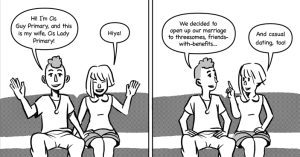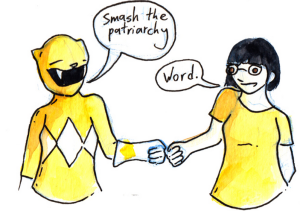
Original Image: MIrror
I won’t keep you in suspense: My answer is going to be no.
But this question is an important one to address in light of how male sexuality is discussed in feminist spaces, especially when it comes to confronting rape culture.
I’ve written on the topic of male sexual entitlement for Everyday Feminism before and found that some read that article as an attack on men and male sexuality in general.
It reminds me of all of the times that women have been chastised for calling out gratuitously contorted women in visual media with excuses like “men like seeing attractive women” and “sex sells!”
It reminds me that, in our culture, pointing out the objectification of women is more likely to be seen as an affront to sexual norms than recognition of something problematic.
However, the reaction to that article also highlighted the importance of making the distinction between male sexuality in and of itself and male sexual entitlement, which is the belief that a man’s sexual desires trump a woman’s bodily autonomy.
Of course all people can be sexually entitled.
However, male sexual entitlement is being reinforced through the media, language, and cultural attitudes towards women.
For proof, scan some magazine covers, HBO dramas, comic books, or club flyers, and compare the number of impossibly-bent, scantily-clad women you see to the number of similarly posed men.
The message you’ll get isn’t just that “sex sells,” but also that women’s bodies are being treated as consumable commodities and women supposedly enjoy this treatment.
This view of women’s bodies — that they are inherently more suited to being seen as sexual fantasy props than men’s bodies, and that we like it that way thankyouverymuch — is part of what fuels male sexual entitlement.
Sexual entitlement is also a view of women’s bodies that is distinct from simply seeing, appreciating, and being sexually attracted to women.
What Male Sexual Entitlement Looks Like
Two people, who I’ll call Mark and Amy, are mutually attracted to each other and date for six weeks. So far, so good.
Though Mark and Amy are both sexually attracted to each other, Amy doesn’t feel like she’s ready for sex at this point in their relationship.
Here’s where it could get problematic: Mark, frustrated that Amy won’t “put out” as he tells his friends, starts trying to manipulate her into having sex with him.
He does this by playing psychological games — making her out to be a prude, constantly asking her why she isn’t ready to have sex — and outright trying to touch her when she doesn’t want to be touched.
At this point, Mark has just stepped into the zone of male sexual entitlement, and he needs to back the hell up.
His behavior has become threatening to Amy because he believes that she owes him sex.
The reasons why Amy isn’t ready or why Mark feels entitled are irrelevant.
In any situation where someone ignores a clear personal boundary, this kind of behavior is childish and dangerous.
This isn’t male sexuality, even though society wants you to conflate the two by constantly presenting male sexuality as aggressive and domineering.
This isn’t simply being attracted to a woman and being obvious about it.
It’s being attracted to a woman and being pushy, demanding, and harassing.
That’s sexual entitlement. And it’s become so normalized, that calling it out gets equated to attacking all men.
This is Not Sexual Entitlement
Let’s go back to the part of the Mark and Amy story before Mark started sexually harassing Amy.
This time, instead of pushing his desire for sex on Amy as if it’s more important than her needs or wants, Mark communicates like an adult.
If a lack of sex is a deal breaker for him (which is fair), he communicates that clearly.
They may even decide to stop dating if they find that their sexual needs are too incompatible.
Mark is never shamed for being sexually attracted to Amy, and Amy is never shamed for deciding not to have sex. They simply have a conversation and come to an agreement about how their relationship might move forward.
At no point in this second scenario does Mark suggest that his sexual needs must be met by Amy when he wants them to be met.
Even though those needs exist, and he has every right to have them, Amy has equal rights to decide how and when her sexual needs are met.
***
The difference between being sexual and being sexually entitled is strongly tied to recognizing that all people have bodily autonomy and an equal right to have that autonomy respected.
A sexually entitled person thinks other people owe them sex. A rational adult with sexual desires realizes that no one owes them sex — not for being nice, not for marrying them, not for saying yes at one point and no later.
To add to that, consent always takes at least two people, and it begins before sex. Someone doesn’t want to be kissed? Okay. That boundary needs to be respected. Someone doesn’t want to be told she has a “great ass” by a coworker? Also needs to be respected.
Those who choose not to respect these boundaries are coming from a place of entitlement. They are willfully – even knowingly – objectifying others.
They are viewing other people’s bodies as tools of gratification and not as belonging to fellow human beings.
That’s why sexual entitlement is so problematic.
Sexual entitlement is ogling strangers, grabbing asses in clubs, sexually harassing coworkers, complaining about the “friend zone.” It’s taking advantage of unconscious people. It’s rape.
There is a very clear line between having a sexual desire and bludgeoning people with it, and male sexual entitlement crosses that line.
So condemning male sexual entitlement is not an attempt to paint men as virulent pigs who are slaves to their sexual desires.
Because that isn’t true.
And furthermore, the fact that men aren’t slaves to their sexual desires means they can combat male sexual entitlement by noticing ways that our society supports and encourages the belief that men are owed sexual gratification.
That’s why all of us need to educate ourselves about the difference between sexual attraction and sexual entitlement.
We need to know that “boys will be boys” is bullsh*t because men, like all people, are accountable for their actions regardless of their sexuality.
This means we need to notice and call out behaviors and media messages that have been normalized, at the risk of being accused of attacking male sexuality and not the problem we’re really aiming for: patriarchal excuses for sexual entitlement.
So when female comedians get fired or ignored for speaking up against sexual harassment, when women are told they should feel complimented by unwanted comments about their bodies, when lesbian women are treated as male fantasy fodder in porn and television, we need to point out the problematic sense of entitlement that lurks behind them.
The same goes for understanding that sexual entitlement is a cultural problem with real consequences.
It’s behind rape (no rapist doesn’t feel entitled to use another person sexually), the victim-blaming of girls and women who were raped, as well as attempts to coerce women’s sexual expression so men aren’t “driven” to lust after them, with no regard for women’s bodily or sexual agency.
The problem is that when we normalize things at the “benign” level (sending teen boys the message that it’s okay to expect girls to give them sex after dating for some time), we encourage them at the “severe” level (said teen boys grow up expecting sex and, if they don’t get it, try to coerce women into sex).
By continuing to educate ourselves and others about the difference between sexuality and sexual entitlement, we can start to create a meaningful separation between society’s messages about what male sexuality is (aggressive, insatiable) and what male sexuality actually is (there are as many male sexualities as there are men).
And most importantly, we’ll be addressing rape culture’s core problem: the message that the sexual gratification of men is more important than the safety of others.
[do_widget id=”text-101″]
Jarune Uwujaren is a Contributing Writer for Everyday Feminism. Jarune is a Nigerian-American recent grad who’s stumbling towards a career in writing. Jarune can currently be found drifting around the DC metro area with a phone or a laptop nearby. When not writing for fun or profit, Jarune enjoys food, fresh air, good books, drawing, poetry, and sci-fi. Read their articles.
Search our 3000+ articles!
Read our articles about:
Our online racial justice training
Used by hundreds of universities, non-profits, and businesses.
Click to learn more




















